Current as of: July 11, 2025 - 01:14
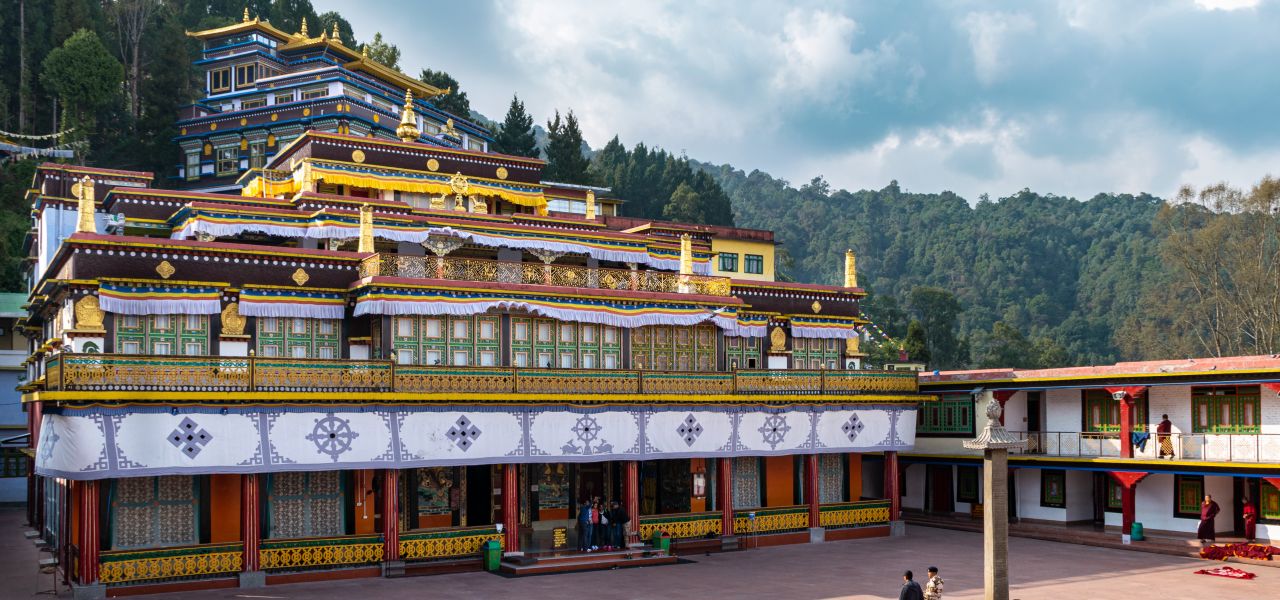
Darjeeling, Sikkim & the Singalila Ridge Trip Notes
- Ways to Travel: Guided Group
- Destination: India
- Programmes: Walking & Trekking
-
Activity Level:
4 out of 7 - Moderate & Challenging
- 15 Days: Land Only
- Ages: 16+
- Trip Code: TBS
- Carbon Footprint: 37kg CO2e
Trip Overview
Enjoy a classic trek from the Darjeeling tea hills to the highest mountain range on Earth
Tucked in a corner of the beautiful Indian Himalaya mountains are Sikkim and Darjeeling. In recent years, Sikkim has become more accessible for those looking to explore its unique beauty. Journey from the plains of India to Gantok, the capital of Sikkim, and onto the delightful Martam village. From here, we travel through beautiful tea plantations to Darjeeling, with its colonial hill station and Unesco World Heritage toy train. Trekking up to and along the Singalila Ridge, which divides India and Nepal, we move through thick forests of rhododendron and are rewarded with views of the great Himalaya peaks. Kanchenjunga, the third highest peak in the world, dominates the horizon and on a clear day we see majestic Makalu, Lhotse and Everest.
At a Glance
- Accommodation: 7 Classic nights (hotels), 8 Simple nights (5 full-service wild camping, 2 sleeper train, 1 guesthouse/homestay)
- Six days of point-to-point walking with full porterage, plus one daywalk
- Group normally 4 to 16, plus leader. Minimum age: 16
Highlights
- Classic camping trek through rhododendron forests to the Singalila Ridge
- See four of the five highest peaks on Earth: Everest, Kanchenjunga, Lhotse and Makalu
- Explore Gangtok, the capital of Sikkim
- Drive through tea plantations and visit a tea estate
- Stay in Martam, a traditional Sikkimese village
Is This Trip for You?
This trip is rated Activity Level 4 (Moderate & Challenging). For more information on our trip gradings please visit the Activity Level Guidelines page. If you have any queries about the difficulty of the trip please do not hesitate to contact us.
There are six days of fully supported point-to-point walking plus one day walk, with an average of four to six hours of walking per day. The trek is on a full-service camping basis. Previous experience of hill walking is required, this is a a good introduction to trekking at altitude but worth noting if you are not used to walking distances over consecutive days, this can present a challenge for some.
The activity level is assessed and based on the general lower altitude limit (relatively) and the overall duration of the trekking days. The maximum sleeping altitude is 11,715ft (3,570m) with a walking maximum altitude of 11,929ft (3,636m) and an average of 9,701ft (2,957m).
Walking hours stated within the itinerary are given as approximates only and vary depending on the group’s pace. They include normal rest stops but not a longer lunch break. Driving times given are approximations and do not include stops for photos, lunch, toilets etc.
On trek, temperatures can get very cold at night and a good 4 season sleeping bag and liner are recommended. The campsite will be set-up by your Porters including dining tent and toilet tent. Please note, the toilet facilities are basic “wild camping”, a tent is placed over a hole dug in the ground and the excess dirt is used to cover any waste after each use.
Group
The trip is led by a qualified English-speaking local leader. On trek, there is a cook, assistants and mules to carry the baggage. Our Indian team has proved very popular with clients with their incredible knowledge, passion and hospitality adding greatly to the experience. There is no better way to experience Indian culture than letting an Indian guide show you around their country.
Adult min age: 16
Min group size: 4
Max group size: 16
Itinerary
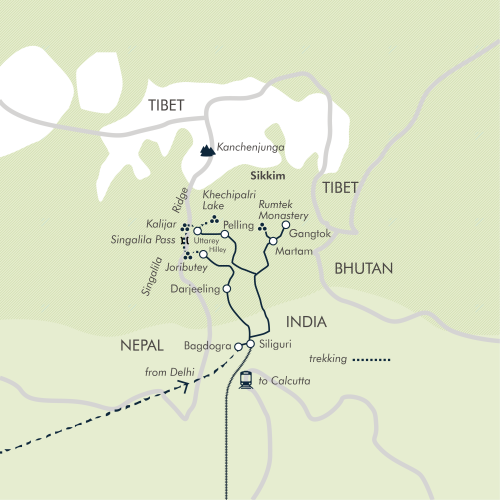
Land Only
- Start City: Delhi
- End City: Kolkata
Land Only Itinerary
Our adventure begins in Delhi, a colourful and chaotic city full of architectural masterpieces.
Around 6pm, say namaste to your tour leader and fellow travellers, when we gather as a group for the first time to get to know each other and learn more about the adventures ahead.
Your tour leader then ensures a big welcome by arranging an optional group dinner at a nearby restaurant (this will be included for all in 2026).
Want more time in Delhi? Secure pre-tour hotel nights through your sales representative.
Accommodation: Hotel Bloom Karol Bagh (or similar)
We transfer to the domestic airport terminal and fly to Bagdogra. On arrival, we join our vehicles and drive to Gangtok. The road soon leaves the plains and at Sevoke we cross the Teesta River and climb into the Doar Hills. At Rangpo, we take a break as we enter Sikkim. Border formalities take time – you need your passport and one photograph. Climbing further, we reach Gangtok, the capital of Sikkim, set at an elevation of 5,510ft (1,680m). The drive usually takes about five hours (78mi/125km) but has been known to take up to 10 hours in instances where landslides have occurred from heavy rain along the route. Your leader will advise if your journey is likely to be affected.
Accommodation: Netuk House, Gangtok (or similar)

Gangtok is set among the hills and, on a clear day, we can see Kanchenjunga from the hotel. We have the morning for exploration. The Mall Road is the centre of Gangtok and the nearby indoor vegetable market makes for an interesting wander. Either explore Gangtok solo or your leader can take you to see some of the sights. About an hour’s walk from the hotel there is the small Enchey monastery. Overlooking the town, it was founded in 1840 by Lama Drubthob Karpo and was rebuilt in 1908 by the 10th chogyal (king) of Sikkim. From the monastery, walk back to town via the Flower Show, a small exhibition of orchids and other local flowers. There is a handicraft centre close by, which is a government enterprise offering community training in traditional handicrafts such as carpet weaving and wood carving.
After lunch, we have an hour’s drive to Rumtek monastery. Founded in the mid-1700s by the 12th Karmapa, it fell into ruins. When the 16th Karmapa came from Tibet, he rebuilt the monastery as the main seat in exile of the Karmapa sect. It is the largest monastery in Sikkim and contains a golden stupa with the remains of the 16th Karmapa. A 30-minute drive brings us to Martam, a scenic Himalayan village in a quiet corner of East Sikkim.
Accommodation: Martam Resorts (or similar)
We spend today in the pretty village of Martam, which was known for producing butter and other dairy products (mar means butter and tem means spread). The population is about 10,000, made of Bhutia and Nepali communities. In the morning, we go for a hike around the village. We can visit the interesting Nyingma Institute, which provides education in higher Buddhist studies and philosophy to many monks. There is also another small monastery and a Krishna Mandir in the village. We return to our hotel for lunch and the afternoon is free.
Accommodation: Martam Resorts (or similar)
Leaving Sikkim, we drive to Darjeeling. The road winds all the way to the Testa River, where we enter the state of West Bengal. It then weaves back into the hills to Darjeeling. We arrive by lunchtime; this afternoon, we explore one of the most famous hill stations of the British Raj. The region originally belonged to the chogyals of Sikkim, before it was annexed by the Gurkhas. By the early 1800s, it was in the control of the British East India Company who returned it to Sikkim rule. Stumbling across Dorje Ling Monastery, situated on a quiet forested ridge, two British soldiers thought it would make a great location for a sanatorium and with the permission of the Sikkim king, a hill station was born. Today, Darjeeling is a bustling town but the Mall still retains Victorian charm. Our stay includes a visit to the Himalayan Mountaineering Institute, where many famous Sherpa climbers trained in mountaineering skills. There are interesting displays and photographs from some of the early Everest climbs.
Today’s drive is 50mi (80km) and will take approximately four hours; however, there may be delays due to landslides caused by heavy rain. Your leader will advise if this is the case.
Accommodation: Sinclairs Hotel (or similar)

On a clear day, wake early for beautiful sunrise views of Kanchenjunga from the roof of our hotel. After breakfast, we have a 40-minute ride on the toy train to Ghoom (subject to running, see Day 13 for another opportunity if not running today). The train chugs out of Darjeeling, stopping to take on water and to allow passengers to photograph the Batasia Loop. At Ghoom, we meet our cars and drive for around four hours to Rimbik, the trailhead of our trek at 7,500ft (2,286m). We have a 45-minute gentle uphill walk through magnificent rhododendron forests (a blaze of reds in spring) to our camp at Manedara, where we spend our first night under canvas. As we approach the village, we have stunning views of Kabru Dome and Kabru South peaks.
Accommodation: Full-service camp – sleeping altitude: 8,040ft (2,450m)
Please note: Any baggage not needed during the trek can be left at our hotel in Darjeeling until we return on Day 12.
Today we start our trek with an easy trail passing small houses and fields. It is about two hours’ gradual walk through beautiful forest to Shepi village. We then descend to the Gurdum Khola river, which we cross by bridge and after a steep one-hour climb to Gurdum village, we arrive at our camp for the evening.
Accommodation: Full-service camp – sleeping altitude: 7,875ft (2,400m)
It’s a fairly tough but rewarding day as we finish our ascent to the Singalila Ridge. The trail climbs steeply in places until we emerge at a forest clearing. From here, it undulates through rhododendron forest to the ridgetop at Sandakhphu (11,929ft/3,636m), the highest point of our trek. On a clear day, the climb is well worth the effort as we are rewarded with a magnificent Himalayan panorama. The views from here are truly amazing – the towering slopes of Kanchenjunga lie ahead and Everest, Lhotse and Makalu come into view in the distance. After lunch at Sandakhphu, it is a gradual walk on a rough jeep track to our camp at Chandu.
Accommodation: Full-service camp – sleeping altitude: 11,715ft (3,570m)
We are now on the Singalila Ridge, the border between Nepal and India, which means at times we are walking in each country. This is a great day for views. The trail undulates, following the ridge through chestnut, oak and silver fir trees with commanding panoramic views of the Himalaya all day. Dwarf rhododendrons and primulas colour the landscape in spring. Tonight, we have a spectacular wild camp at Sabargam. The views from here are sublime and we hope to see a magnificent sunset and sunrise over Kanchenjunga, Everest, Lhotse and Makalu and a whole host of other Himalayan peaks.
Accommodation: Full-service camp – sleeping altitude: 11,601ft (3,536m)
We enjoy a full day of trekking along an undulating trail to the end of the ridge at Phalut, where we descend to Samaden. On a clear day, we get breathtaking views of Kanchenjunga as we continue along the ridge. The Everest range is further away but Kanchenjunga rears up over us. Phalut is at 11,810ft (3,600m) and just behind the lodge there is a viewpoint where we are surrounded by Himalayan giants. The trail down to Samaden is glorious and takes us through forests of oak, conifers, pine and rhododendrons, an explosion of colour in spring. We camp tonight in Samaden, a small settlement with excellent views.
Accommodation: Full-service camp – sleeping altitude: 8,135ft (2,480m)
Our final trek winds through a collection of small settlements (inhabited by Rais, Sherpas and Tamangs) to Ramman, where terraced fields and villages dot the landscape. We descend along a jeep track to Sri Khola for lunch, after which we cross a suspension bridge and continue for another 2hr 30min along a road, passing through more villages to Rimbik, a large Sherpa village among the forest landscapes of Singalila National Park. We stay in a small lodge with great views across the valley.
Accommodation: Rimbick Lodge (guest house)– sleeping altitude: 7,500ft (2,286m)
Please note, the guest house is a basic home-stay property. Although all bedrooms offer attached bathrooms (including toilets), those with shower facilities are limited and some bedrooms may only provide a sink and “bucket” wash option.

Today we drive back to Darjeeling along a road that winds up and down ridges through picturesque landscapes. En route, we visit a tea estate and learn how this famous drink is grown and processed. We arrive in Darjeeling midafternoon and the rest of the day is free to further explore this historic hill station. Our hotel is close to the Mall, which is a great place to wander in the evening.
Accommodation: Sinclairs Hotel (or similar)
We have the morning to explore further. If we missed the ride on the toy train and Ghoom monastery, there is time this morning. In the afternoon, we set off for the drive to Siliguri (two to three hours) where we board the overnight train to Kolkata. Train times in India change regularly, although it usually departs around 8pm or 9pm.
Accommodation: Overnight sleeper train
We arrive in Kolkata in the early hours of the morning and have the day to explore this fascinating city. Once the capital of British India, Kolkata has a turbulent past. It was central to the struggle for Indian independence and thousands of Bengali refugees came here at the start of the 1900s. It is a city of striking contrasts and the unusual sights, pungent smells and cacophony of sounds are an experience unique to India.
If you would rather not navigate Kolkata alone, your leader can usually arrange a short guided city tour for you (pay locally).
Accommodation: Hotel Peerless Inn (or similar)
The adventure ends in Kolkata after breakfast. If you’d like a little more adventure, however, consider joining our five-day Golden Triangle extension. Encompassing Delhi, Jaipur and Agra, the trip is a whirlwind of culture, taking in the Taj Mahal, Red Fort of Akbar and much more. Speak to your sales representative about extending your stay.
Extend Your Trip
Golden Triangle Add-on Tour

A visit to the incredible Taj Mahal and other great Moghul cities close to Delhi is an excellent add-on to a visit to northern India.
The Taj Mahal in Agra was built by the Moghul emperor Shah Jahan in memory of his beloved wife, and is one of the most beautiful sights on earth. Close by is the imposing Red Fort of Akbar with its beautiful courtyards and palaces and let’s not forget the deserted royal city of Fatehpur Sikri. The extension also visits the pink city of Jaipur, capital of Rajasthan, which is one of the most attractive and colourful cities in India.
The detailed itinerary is here, or speak to your sales representative for more details.
Altitude Warning: This trip includes one or more nights over 9,845ft (3,000m) above sea level, where there is a genuine risk of being affected by acute altitude illnesses; if left untreated, this can be life-threatening. Most should expect to experience some mild symptoms of altitude sickness, such as headaches, shortness of breath or sleeplessness. Our leaders are trained to identify symptoms of severe altitude illnesses and, if a customer requires extra care, arrangements such as a rapid descent will be made.
Exodus itineraries are informed by the Wilderness Medical Society (WMS) Guidelines for the Prevention of Altitude Illnesses and designed to allow for adequate acclimatisation. Due to terrain and/or logistical factors, there may be nights where the sleeping altitude gain is more than 1,640ft (500m), increasing the risk. The WMS highlight that because the rates of acclimatisation and physiologic responses to high altitude vary considerably between individuals, the recommendations given, although generally effective, do not guarantee successful prevention. Participants should be aware of the inherent risk posed by altitude.
Several medical conditions or medications can affect a person’s ability to acclimatise, making them more susceptible to acute altitude illnesses. Those with pre-existing conditions, such as heart or lung conditions, those who have suffered with altitude sickness before, or those with concerns about overall physical ability, should consult their doctor before booking. The drug Diamox (acetazolamide) may aid acclimatisation in some individuals. Those considering using Diamox should speak to their doctor about the drug, its suitability, side-effects, and a prescription. Please note, while we endeavour to assist all our customers in achieving their goals, there may be times when a leader decides to delay or stop someone’s ascent based on their condition.
If you are not taking out Exodus Travel Insurance, make sure your policy covers you up to the maximum altitude on this trip (if trekking in the Himalaya your policy should also cover the use of a helicopter for emergency medical evacuation).
Ascents, descents and distances: All ascents, descents and distances listed in the daily itinerary have been measured by our local partners or tour leaders, in many cases with satellite-based mapping software. However, different GPS measuring devices can give differing results, particularly on winding paths or in mountainous terrain. Measurements stated throughout these Trips Notes are given to help you understand the types of terrain and distances you will encounter. Timings stated will vary depending on the pace of your group.
Accommodation
Hotel, camping, guesthouse and sleeper train
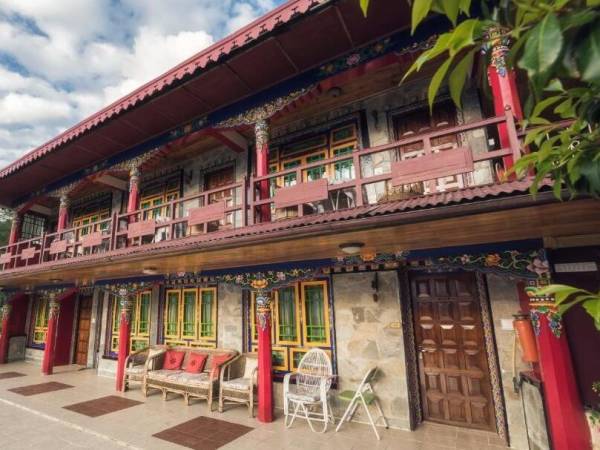
We experience a mixture of accommodations on this trip, including hotels, full-service wild camping, a local lodge (in Rimbick) and the sleeper train from Siliguri to Kolkata. We choose hotels that are conveniently located (close to villages and attractions) or with good transport connections. We aim to use smaller, locally owned properties wherever possible. These are typically two to three-star (local rating) and with a mix of heritage and modern styles.
While the accommodations typically used on this trip are on the day-to-day itinerary, below are some of the notable stays.
Gangtok: Netuk House (night 2)
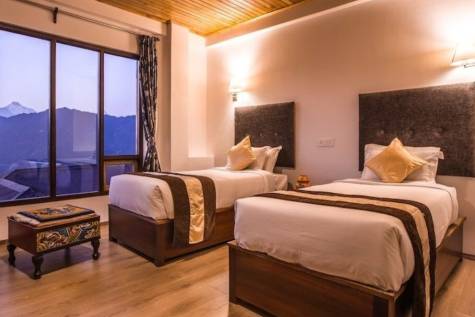
Built in the 1950s, this boutique hotel offers history and tradition from the days when the Tibet Road was a well trodden route for silk traders to and from Tibet. It has a home-from-home feel with a comfortable sitting area, in which you can relax, read, or meet together, plus there’s a garden terrace, restaurant and bar.
Darjeeling: Sinclairs (night 5)
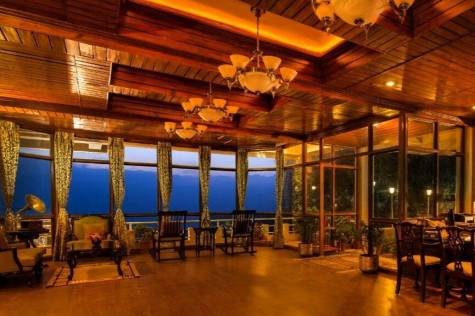
With echoes of the Victorian era but the amenities of modern living, Sinclairs is a great place to stay. But it’s the stunning views of mount Kanchenjunga, the third-highest mountain in the world, that really set it apart. There’s also a multi-cuisine restaurant, games room, and bar to keep you entertained.
Full-service camping: (nights 6-10)
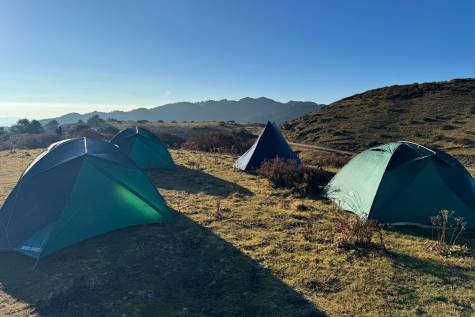
The trek itself is on a full-service camping basis, meaning our camp staff put up and dismantle the tents, cook, and do the camp chores. You need only carry your backpack for the day. Most of the camping on this trek is wild camping. We stay in two-person tents, which have enough room inside for your kitbags. Single-occupancy tents are smaller to avoid too much empty space, which loses warmth. Sleeping mats and sleeping bags are not provided – please see the packing section.
We also have a dining tent with table and folding chairs, and at least one toilet tent (usually two) for use during the evenings. Please note, the toilets are based on “wild camping” principles – a hole in the ground with excess dirt used to cover waste (no flushing here). There is no running water available while camping; however, we camp close to a water source and the camp staff provide bowls of warm water to wash with. Please ensure you always wash your hands with water and soap after using the toilet and before meals, additional use of hand sanitiser is also recommended.
Siliguri to Kolkata: Sleeper train (night 13)
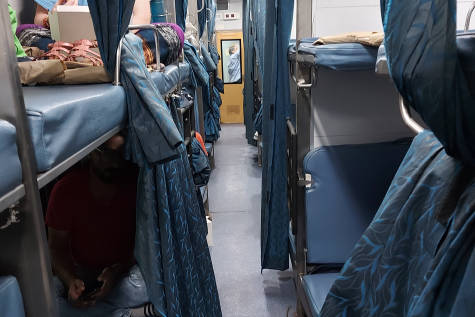
Kolkata: Hotel Peerless Inn (night 14)
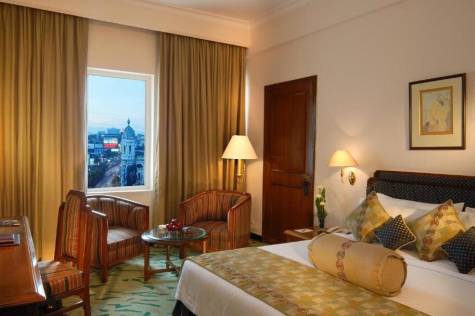
The Peerless Inn is a convenient 20-minute walk from the historical Esplanade area and only a 10-minute walk from downtown Kolkata. It’s a modern hotel with features such as a fitness center, award-winning restaurant serving authentic Bengali cuisine, and a multi-cuisine restaurant.
Worth knowing
- The weather can get cold in some of the higher regions and although most hotels should offer heating, not all do. You can request more blankets if needed or the hotel may be able to provide a standing heater for your room. Please talk to your tour leader if you need help in this matter.
- It’s common for hotels in India to have limited times in the day for hot water use to save energy. If you find your shower is cold, please let your leader or reception know so they can make sure the water heater is on.
- The guesthouse in Rimbick is a basic homestay property, shower facilities are limited and some bedrooms may only provide a sink and bucket wash option.
- Sleeper trains are not enclosed compartments, bed bunks are set up within a carriage with curtains for some privacy.
- Within the sleeper train, you may be sharing a compartment of four beds with members of the public depending on how the seats are allocated.
- Should you wish to extend your stay, we can book additional nights for you either before the tour in Delhi or after the tour in Kolkata – please enquire at the time of booking.
- Single rooms and tents (excluding sleeper train) are available for a supplement: the price depends on the season you are travelling. Please advise your sales representative at the time of booking if you wish to add this to your booking and they will confirm the price for you.
Single supplement from £ 495
Food & Drink
All breakfasts, seven lunches and 10 dinners are included.
Allow at least 1,600-2,000 rupees (approximately US$20-US$25) per day for lunch and dinner (where not included). You can eat out cheaply in India, but if you go to the more expensive restaurants most of the time, you will spend the upper limits of the suggested amount. Please note, service in restaurants can be quite slow. Tea and soft drinks are reasonably priced. A (large) bottle of beer is approximately 400 rupees (approximately US$5).
While camping, we have a cook and assistants who prepare simple but plentiful nutritious food. Breakfasts will be porridge, cereals, eggs and toast with plenty of tea, coffee or hot chocolate. Lunches will usually be a picnic lunch with soup, various kinds of local breads, cheese, eggs, tinned fish, and meat and fruit where available. There is afternoon tea and biscuits on arrival at camp followed later by dinner, which is usually soup, a pasta, rice or potato-based main course with fresh vegetables, followed by dessert, tea, coffee or hot chocolate.
Drinking water
Staying hydrated is important when undertaking any physical activity. However, we strongly encourage you not to buy bottled water as this contributes to the growing problem of plastic pollution in India
On trek, the cooks collect and boil drinking water from the mountain streams and fill up your water bottles for you, but you may need to collect water during the day and may wish to use your own water purification treatment as well. Purification tablets can be an economical way to treat your water, most taking between 30 minutes to one hour to purify one litre of water and are easy to used in water bladders/hydration packs. Purification tablets which contain chlorine dioxide are reported not to leave an obvious taste as other tablets may.
We suggest you may like to bring a reusable bottle with a wide opening and use a Steripen to treat any non-boiled water. A Steripen is a handheld UV water purifier – small, lightweight and battery powered, so easy to pack. It’s quick to use, far more effective than purification tablets, and the water is ready immediately. It’s fine to use a Steripen on non-boiled water so long as it isn’t cloudy or full of sediment (which is uncommon in these regions).
Steripens are widely stocked on Amazon, outdoor shops and other online retailers; look for the latest models but avoid USB charging ones. Models that take lithium batteries are best as they last longer, especially in cold conditions.
Transport
We use a combination of private minibus, Jeeps and trains for our journey. In Delhi and Kolkata, transfers are by bus or minibus depending on the group size. In Darjeeling and Sikkim, we take 4WD jeeps due to the variable and in some cases poor condition of the roads for comfort and reliability. During periods of heavy rain, landslides can occur and some journeys in the Darjeeling and Sikkim regions may take longer due to traffic diversions. Your leader will advise when this may be the case.
The overnight train from Siliguri to Kolkata will be booked in two-tier (or three-tier depending on availability) air-conditioned sleeper (see accommodation section for further information).
Domestic Flights: Please note the domestic flight from Delhi to Bagdogra has the following baggage allowance (this may be lower than your international flight allowance).
- Hand baggage: One bag up to 7kg and 115 cm (L+W+H : dimension: 55cm x 35cm x 25cm) per person
- Check-in baggage: 15kg allowance per person (one piece only)
- Please note, electronic devices, power packs and batteries should be packed in hand luggage as these are not permitted in your hold/main luggage.
- Excess baggage charge: Approximately 500 – 600 rupees (US$6 – 7) per 1 kilogram over 15kg
Weather & Seasonality
As Sikkim has a pretty wet climate, even by Himalayan standards, our departures are carefully timed to take advantage of the likely best weather conditions (within reason). Delhi is hot in the daytime, especially on spring departures (highs of mid-30 degrees Celsius), and reasonably warm at night (cool on the October departure). Darjeeling and Gangtok is warm during the day with cool to cold nightly temperatures. Weather on trek will vary with the altitude but is generally comfortable for walking during the day (it can be really quite hot when the sun is out, particularly on the spring departure). At night on trek, it can get very cold with temperatures down to as low as -5C (23F). In late October, please bring warm clothes for the evenings. Frost must be expected at night above about 9,845ft (3,000m) on spring departures, and above about 6,560ft (2,000m) on October departures.
Although the departures are timed to coincide when the weather is normally good, in any mountain area the weather is never wholly predictable and you should be prepared and equipped to deal with any differences in weather beyond the conditions described above. The Singalila Ridge is quite exposed and strong wind and rain cannot be discounted at any time of year. You need to carry waterproofs and warm clothes for the evenings.
Joining Instructions
Key information
Start hotel: Hotel Bloom Karol Bagh, 17A/32, Gurudwara Road, Near Pusa Road, Metro Pillar No: 98-99, Opposite Jessaram Hospital, WEA, Karol Bagh, New Delhi, 110005
Phone: +91 11 4641 3759
Recommended arrival time: You can arrive at any time today. There will be a welcome briefing around 6pm this evening.
Airport: Indira Gandhi International Airport (DEL)
Getting to the start hotel
The start hotel is approximately 35 minutes’ drive from the airport. Exodus provides free arrival transfers to the start hotel from the airport for all customers. If you would like further information on joining this trip, please speak to your sales representative.
Catching your return flight
There’s a group departure transfer to the airport for customers who Exodus booked onto a chosen flight to London, UK. Please speak to your sales representative if you wish to join. If the group departure transfer does not suit your flight time, speak to your sales representative to arrange an alternative transfer.
Full joining instructions including local emergency numbers will be sent to you as part of our Final Joining Instructions. If you do not receive these at least a week before departure, or require them earlier please contact our office or your travel agent.
Location start: Delhi
Location end: Kolkata
What To Take
Essential Equipment
You are restricted to 33lb (15kg) of luggage on trek. Any baggage not needed on trek can be left at the hotel in Darjeeling (Day 6) free of charge, until we return to the hotel on Day 12. Please also see the ‘internal flights weight limit’ section below.
- Four passport photos for your permits (you may only use one or two; however, regulations change at little or no notice so bring four to be safe)
- Four-season sleeping bag (with a comfort rating of down to at least -5C/23F)
- Sleeping bag liner
- Sleeping mattress/Therm-a-Rest
- Three-season jacket
- Waterproof synthetic or leather walking boots (worn in)
- Waterproof jacket and trousers (pants)
- Sandals/trainers (sneakers)
- Warm hat
- Gloves
- Several pairs of walking socks
- Trekking pole(s)
- Warm layers or thermals for the evenings
- Warm mid-layer (fleece)
- Shirts/T-shirts/base layers
- Light to mid-weight trousers (pants)
- Long shorts or skirt for women
- Sunhat, sunglasses, sunscreen and lip salve with sun protection
- Backpack for the daytime
- Trek towel
- Headtorch (head lamp)
- Refillable water bottle/water bladder (also known as a hydration pack/CamelBak, which are useful for re-hydrating on the go)
- Hand-washing gel
- Water purification
- Plastic bags to line backpack and for packing clothing in the kitbag
- Toilet paper
- Small personal first-aid kit
Donations for Dhotrey and Samadin schools
We support underprivileged children at a couple of primary schools in Dhotrey and Samadin. Although the basic education is looked after by the government, facilities and education in the area are still limited.
If you have any extra room in your luggage, the school and children would appreciate any of the following items: books for five to 15-year-olds, notebooks, pens, crayons, painting books, school bags, children’s socks or underwear, warm hats and gloves, toothpaste and toothbrushes, lightweight board games. These items can be handed to your leader on arrival at the hotel in Delhi, and your leader will arrange for it to be transported to the schools.
Environmental considerations: We believe in reducing our negative environmental impact wherever possible, even when nature calls. If no facilities are available, you may need to go behind a tree, bush or rock. To avoid leaving toilet paper behind, we recommend taking biodegradable bags with you. Once you have done your business, put the used paper in the bag and dispose when appropriate facilities are available.
Equipment hire partners
We have partnered with the following outdoor specialist for great rates on expedition kit hire (UK-based customers only) or just general advice and guidance on the best kit and equipment needed for your trek.
- TrekHire: Offers Exodus customers a four-week hire period for their technical gear, including items such as down sleeping bags (which includes cleaning costs). This extended hire period gives you ample time to prepare and return your gear after your trip. TrekHire also provides assistance with reviewing your kit list, offering advice on how to use your gear, and recommending what to buy or avoid. Additionally, they own a shop called Surrey Trek and Run, where you can enjoy a 10% discount on in-store items (excluding walking boots).
- Expedition Kit Hire: Offers a 10% discount on hire prices for Exodus customers (excluding already discounted pre-made package deal kit lists, such as those for Kilimanjaro and Everest Basecamp). For extended hires (beyond the standard two-week hire), they offer a reduced daily rate, which often provides savings greater than 10%. Please ask our Customer Operations team for the Exodus customer discount code.
Exodus kitbag
If you book this trip, we provide a free Exodus kitbag to pack your luggage in while on trek. Once you have booked, you will be sent instructions on how to claim your bag (they are not sent automatically). Please note, if you book less than three weeks before the departure date, we cannot guarantee your kitbag will arrive before your trip starts. If this is the case, please contact us on customerops@exodus.co.uk (or customeroperations@exodustravels.com if you’re based in the US or Canada). See www.exodus.co.uk/kitbags for full T&Cs.
Optional Equipment
- Gaiters
- Biodegradable soap/shampoo
- Walking Poles
Prohibited items to travel with in India
- The Indian government has banned e-cigarettes and related products. You can’t buy e-cigarettes in India or bring them into the country. Please ensure you do not pack these in your luggage.
- Satellite communications devices, for example (but not exclusively) Garmin inReach or any other brand GPS tracking device, are illegal in India without a license. Please do not bring them with you.
Practical Information
Visa
To avoid possible problems at immigration, make sure your passport is valid for a minimum of 180 days at the time of entry into India.
Travellers from the UK, US, CA and EU normally need a visa to enter India. Please note, visa requirements often change and it is your responsibility to obtain any required visas for this trip. Therefore, we recommend that you check with the nearest embassy or consulate of your chosen destination(s), including any countries you may be transiting or transferring through.
Some local governments provide guidance on what visas their citizens need. To help, we’ve gathered a selection of useful links below.
• Australia: www.smartraveller.gov.au/destinations/asia/india
• Canada: www.travel.gc.ca/destinations/india
• United Kingdom: www.gov.uk/foreign-travel-advice/india/entry-requirements
• USA: www.travel.state.gov/content/travel/en/international-travel/International-Travel-Country-Information-Pages/India.html
Travellers eligible for an e-visa, which includes those from the UK, US, CA and EU, can apply at www.indianvisaonline.gov.in/evisa/tvoa.html.
For more information on applying for your Indian Visa, including details required for your start hotel and local reference contacts, please click on this link: Indian Visa Information
Please note: If your trip visits Sikkim in the northeast or Ladakh, in the very north of India, do not mention this on your Indian visa application. This can sometimes slow down or even cause the embassy to reject your visa.
Vaccinations and Health
India
You require a yellow fever vaccination certificate if arriving from a country with risk of yellow fever transmission. Proof of a polio vaccination may also be required by some visitors. Please confirm all requirements and recommendations with your doctor or travel clinic.
You may also want to consider vaccinations for tetanus, hepatitis A, typhoid, cholera, hepatitis B, Japanese encephalitis, rabies and tuberculosis. The risk of malaria is slight, but you may wish to consult your doctor or travel clinic for further advice.
Additionally, dengue fever and chikungunya are known risks in India. Both are tropical viral diseases spread by daytime biting mosquitoes. There is currently no vaccine or prophylaxis available for either, and therefore the best form of prevention is to avoid being bitten. We recommend you take the usual precautions to avoid mosquito bites.
Some of our India trips spend time at altitude. In regions over approximately 6,560ft (2,000m), there is little risk of mosquito-borne diseases. For trips above 9,840ft (3,000m), there is a risk of being affected by acute mountain sickness. Our itineraries are designed to enable everyone to acclimatise to these altitudes, but you should be aware that it is still possible for you to be affected. Please see the Trip Notes for further information.
Local Time
India's time zone: Asia/Kolkata (UTC +05:30)
Electricity
India's electricity: Plug types C (two round pins), D (three round pins) and M (three round pins) – 230V, 50Hz
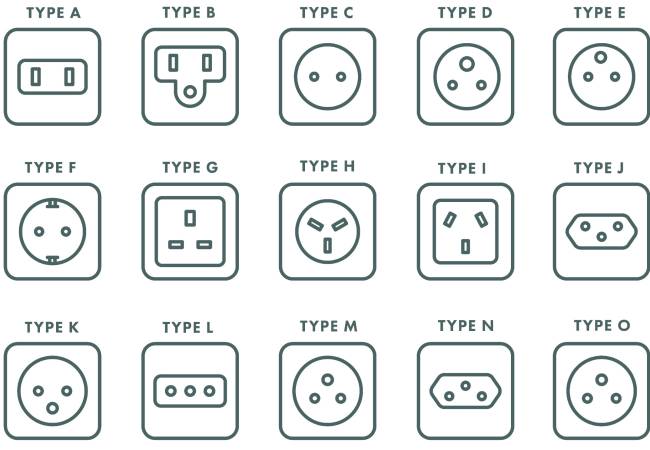
Money
India's currency: Indian rupee (INR). Please note, it is illegal to import or export rupees. Do not accept torn or very dirty Indian banknotes from banks or in change as they will almost certainly not be accepted as legal tender in India. You can normally change money back from rupees into US dollars or British pounds at the departure airport, but you must produce an exchange receipt showing that you changed money in India.
ATM Availability
ATMs are available in the big cities in India and are generally reliable (Visa and Mastercard are best); however, you should not rely on these 100 percent of the time, so take cash with you too. Inform your bank before departure that you are travelling to India. You can pay with credit cards in bigger shops all over India.
Extra Expenses & Spending Money
It makes no difference whether you bring British pounds or US dollars. You can change your money on arrival at Delhi airport but the rates tend to be very poor at the airport so we recommend changing cash in Delhi and in Kolkata. Although changing money outside of Delhi and Kolkata is not advised, it is possible to change US dollars and British pounds in cash in both Darjeeling and Gangtok but please note the exchange rates may be lower than in Delhi.
Apart from the extra food, allow approximately 500 rupees (US$7) a day for drinks and incidentals, more if you enjoy a few beers, as these are comparatively expensive in India. On trek, there is not very much to buy, but in Delhi, Gangtok, Darjeeling and Kolkata there is a wealth of souvenirs and trinkets.
India has very good shopping opportunities, especially for locally made goods, and in Delhi local guides may offer to take you to emporiums or workshops where these goods are made. Many people find this a great opportunity to buy local handicrafts, silk, jewellery and carpets. Guides often assume visitors want to shop, it is very much part of the culture; however, if you do not wish to go, please make this clear to your local guide at the time.
Tipping
Tipping is entirely at your discretion but is customary in India. Tipping can be an awkward affair especially when you are not familiar with the country. Your leader will help with tipping and will provide a list of suggested tips. This will include tips for drivers, hotel porters and other hotel staff, and local sightseeing guides. It will also include camp staff, such as guides, assistants, cooks and ponymen. Sometimes your leader collects a kitty during the trip and sometimes they collect the tips towards the end of the trip (occasionally, for very small groups, the leader may need to collect a little more than the suggested amount). We suggest you allow 7,000 rupees total (approximately US$85) per person for this trip.
Tipping of leaders is not included in the kitty and is at your own discretion. If you wish to tip, around 2,000-3,000 rupees (US$25-US$35) per person would be appreciated.
It is preferable to tip in local currency where possible.
Sustainability and Impact
As a certified B Corp, we’re on a mission to improve our social and environmental impact across all our adventures.
We do this through our innovative Thriving Nature, Thriving People plan.
This ‘nature positive’ approach is designed to help nature and communities thrive in harmony though practical solutions, such as reducing carbon and waste on our trips, supporting conservation projects through the Exodus Adventure Travels Foundation, and rewilding 100 square metres for every Exodus traveller.
Important Information
Your safe participation
When booking this trip, you should be confident in your ability to participate in all activities described in these Trip Notes. If you have any doubt about your suitability, please call us and ask to speak to one of the experts on this itinerary.
Although our leaders are well trained to deal with different capabilities, if they have any concerns about someone’s ability to safely take part in an activity, or their impact on other people’s enjoyment, we authorise them to take necessary action which, in some circumstances, may involve asking someone to miss that activity.
By booking this trip you agree to our Booking Conditions which clearly state that our leaders have the authority to do this. In these rare instances we will ensure anyone sitting out is safely provided for and offered alternative options where possible. Refunds will not be provided for activities missed and customers may be liable for additional costs incurred.
Seatbelts
All vehicles used by us should be equipped with working seatbelts, except where approved by us based on the vehicle type or journey. Wherever seatbelts are available, we require our customers to use them for their own safety, even where it may not be a legal requirement.
How to Book
- Check availability: Go online to check availability, or contact us by phone or email.
- Secure your place: You can provisionally hold a place on this trip, usually for between three and seven days.
- Complete your booking and payment
When you’re ready to book, go to our website for online bookings, book over the phone or you can complete a booking form (available online or on request by calling us). We accept all major credit and debit cards.
After booking
You will receive your booking confirmation letter and invoice, which includes extra information and guidance about your travel arrangements.
Full joining instructions, including local emergency numbers and details of how to reach the start point, will be sent to you approximately two to three weeks prior to departure. If you do not receive these at least a week before departure, or require them earlier, please contact our office or your travel agent.
Trip Note validity
These Trip Notes are valid from the “Current as” date on page one. They will occasionally be updated after booking and before departure; if there are any updates that significantly impact the inclusions or itinerary, customers will be written to separately. They will also receive a link to the most up-to-date Trip Notes with their Final Joining Instructions before travelling.
The information in these Trip Notes is given in good faith. Where differences exist between the Trip Notes and our current brochure or website, the Trip Notes supersede the brochure and website. All holidays can be subject to unexpected changes; to enjoy them you should be prepared to be flexible where necessary. Occasionally, it may not be possible to follow the itinerary as planned. This may be for a variety of reasons – climatic, political, physical or other. In these circumstances we will make the best-possible alternative arrangements that maintain the integrity of the original itinerary.
Licensing
Exodus is fully licensed and bonded as a tour operator. We hold Air Traffic Organisers Licence (ATOL) number 2582, issued and bonded with the Civil Aviation Authority (CAA). We are also bonded to the International Air Transport Association (IATA) and we are members of the Federation of Tour Operators (FTO) and ABTA – The Travel Association. This means you can book your Exodus holiday with confidence, as all money paid to us for your trip is fully protected.
